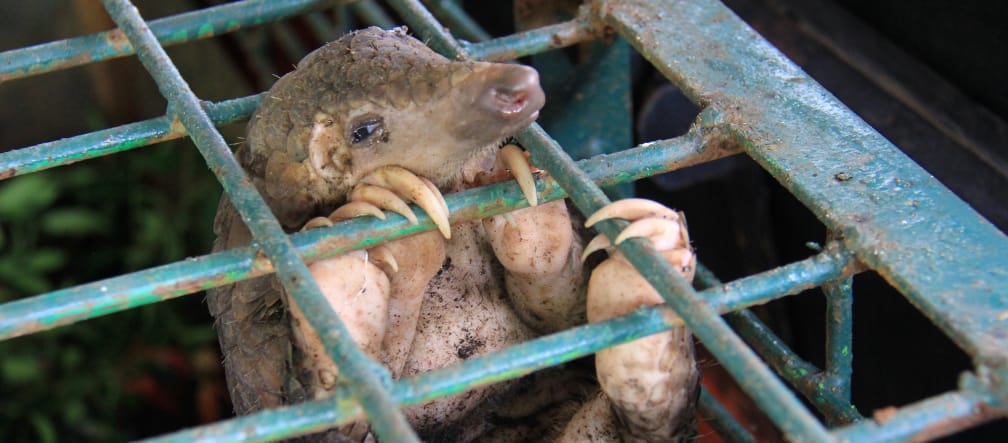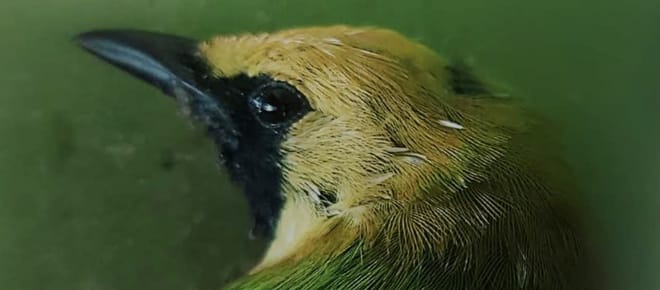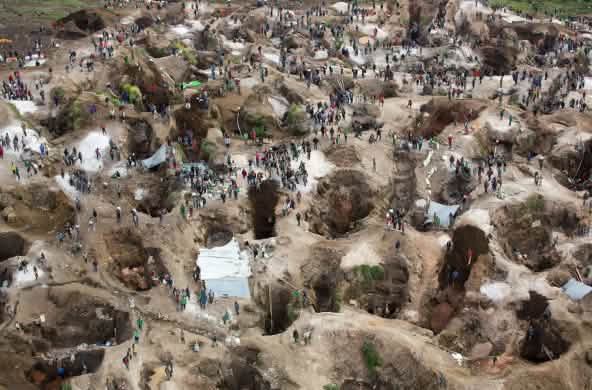
Completed campaign
Shut down wildlife markets NOW!
With their brisk trade in endangered and poached animals, wildlife markets in many countries are driving the extinction of species. The markets are also breeding grounds for diseases that can also be deadly to humans. There is no excuse for the existence of these markets – it’s time to shut them down NOW.
News and updatesTo: the President of the People’s Republic of China and host of the UNCBD Conference, Xi Jinping; David Cooper, Acting Executive Secretary, UNCBD; Member States of the UN
“Wildlife markets encourage the poaching of endangered species and facilitate the spread of diseases. It’s time to shut them down.”The outbreak of coronavirus in Wuhan, China, cast a harsh light on wildlife markets. The Huanan Seafood Market, which offers an apalling variety of live and freshly slaughtered animals, is suspected to be the pandemic’s Ground Zero. According to genetic analyses, bats are the original hosts of the virus, but animals from the wildlife market may have transmitted them to humans.
In addition to seafood, the meat of 30 terrestrial animal species is available there, including pangolins, civets, squirrels, pheasants, scorpions, snakes and a variety of rats.
Such markets not only play a role in the spread of disease: by selling poached, endangered animals such as pangolins, they are pushing species toward extinction.
Illegal hunting and the wildlife trade, like climate change and habitat destruction, are among the causes of the dramatic global extinction of species. In late 2019, a UN report issued a stark warning about the scope of the catastrophe, predicting that up to one million animal and plant species could soon be extinct.
Some forests are already deemed “empty” in the wake of rampant hunting and poaching.
This problem goes beyond China and the current coronavirus pandemic and is driving the extinction of species in many countries, so we are calling for the worldwide closure of wildlife markets.
Please sign and share our petition and speak out against these barbaric markets.
Wildlife markets in China
The SARS (Severe Acute Respiratory Syndrome) epidemic was also caused by a coronavirus. Following the outbreak, China’s authorities initially shut down wildlife markets, but allowed them to reopen after SARS had run its course.
Most Chinese people do not shop at wildlife markets. Wildlife products are comparatively expensive.
In many countries, people hunt for self-sufficiency. Bans must therefore focus on commercial trade in bushmeat and take local conditions into account.
Furthermore, campaigns to raise awareness are needed to change consumer behavior so as not to criminalize a significant part of the population. Such measures cannot be initiated from the outside, however.
Further information on China’s policy
EIA: EIA supports calls in China to extend temporary wildlife trade ban and make it permanent
WildAid: Chinese Citizens Call for Permanent Ban on Wildlife Markets
Care2: Time to End Illegal Wildlife Markets That Led to Deadly Outbreak of the Coronavirus
The “bushmeat” issue
The international wildlife trade – including ivory, pangolin scales and live birds – is firmly in the hands of organized crime.
The devastating consequences of the predominantly local and regional trade and consumption of bushmeat – the meat of wild animals – are often underestimated, as fish, insects and mollusks are often not counted as bushmeat. Regardless of the legality of the trade, it causes considerable ecological damage and contributes to the extinction of animal species. Bushmeat can also play a key role in the spread of diseases such as Ebola and HIV in Africa or Covid-19 in China.
Reasons for the hunting, trade and consumption of bushmeat
People have been eating bushmeat for generations and consider it to be a normal part of their diet. Many buyers prefer bushmeat for flavor or health reasons.
While hunting can serve mainly for personal consumption, hunters often sell bushmeat as an additional source of income. For commercial hunters, the sale of bushmeat is their main source of income, with city dwellers representing an important market.
Hunting can be easier or more lucrative than animal agriculture.
Bushmeat can be the sole or primary source of protein, especially among poorer people. Nevertheless, the consumption of bushmeat can also be a status symbol for wealthier sections of the population.
A small part of the trade in bushmeat from rainforest areas extends as far as Europe.
Why is bushmeat consumption ecologically harmful?
The consumption of bushmeat is becoming an increasingly pressing problem in that it contributes to the extinction of species at the local to global level.
Many animal species are already endangered, for example because their habitat is being destroyed by logging, plantations, mining and settlements or because of the introduction of invasive species. Hunting can add to the pressure, or be a threat to the survival of species on its own. According to one study, 301 terrestrial mammal species are in danger because they are hunted by humans. Animals with low birth rates, such as primates, are particularly hard-hit.
Hunting can alter and endanger entire ecosystems, i.e. the interaction of numerous animal and plant species.
Why the bushmeat problem is growing
There is nothing new about humans hunting animals to extinction. Wherever humans arrived over the past millennia, large mammal and bird species were often the first to go. Now the problem is getting worse for a number of reasons.
- Roads are penetrating rainforest areas, allowing settlers and hunters to enter previously inaccessible regions.
- For sellers of bushmeat, the market is growing: inhabitants of growing cities and new settlers buy the meat, as well as workers on road construction or dam projects or plantations, for example.
- Demand is growing as the human population increases – both in rural and urban areas.
- Hunting methods are becoming more efficient. Where traditional hunters only kill what they need, commercial hunters kill virtually any animal they can.
Legal or illegal?
Hunting of endangered species is illegal in many countries. However, authorities are often unable to monitor and enforce the relevant regulations. Moreover, the ecological damage is not limited to illegal hunting. Legal hunting can also endanger the existence of populations, for example if hunting pressure increases significantly or animal species are not protected by law. Legal hunting in the vicinity of protected areas also endangers species that migrate beyond the territorial limits.
What can be done about the crisis?
The complexity of the bushmeat issue doesn’t lend itself to simple, fast solutions. All measures must take the needs of the local and indigenous population into account in order to effectively address the problem.
- Existing bans must be enforced. Illegal hunting and illegal trade must be stopped. Protected areas must actually guarantee protection.
- Wildlife markets must be shut down, even if the activities there have not yet broken any laws. The ban must also extend to restaurants, mail order and online trading platforms.
- Alternative sources of protein must be promoted, for example through aquaculture or other forms of animal agriculture. The use of plant proteins must also be encouraged where appropriate.
- A change in consumer behavior, particularly among city dwellers, must be effected. Essential building blocks to this end are education and raising awareness about ecology, the negative consequences of bushmeat consumption and existing bans.
To: the President of the People’s Republic of China and host of the UNCBD Conference, Xi Jinping; David Cooper, Acting Executive Secretary, UNCBD; Member States of the UN
Dear Mr. President, Ladies and Gentlemen,
The outbreak of coronavirus in Wuhan, China, cast a harsh light on wildlife markets. The Huanan Seafood Market, which offers a wide range of live and freshly slaughtered animals, is suspected as the pandemic’s point of origin.
However, such markets not only play a role in the spread of disease: by selling poached, endangered animals such as pangolins, they are pushing species toward extinction.
We call on you to shut down markets where poached or endangered animals are sold.
The ban must not be limited to meat and animals for human consumption, but must also apply to wild animal parts and products for allegedly medicinal purposes and jewelry, as well as the sale of animals – both captured and bred in captivity – as pets.
Without a complete ban, the trade could continue to drive demand for such products and provide incentives for poaching and other illegal activities.
The ban must also extend to restaurants, mail order and online trading platforms.
The protection of human health and the fight against mass extinction will require a firm response.
Yours faithfully,

A single truck carrying 6,514 birds, crammed into 216 crates by bird traffickers, was seized by police at a port in Sumatra. The tireless work of our partner organization, Flight – Protecting Indonesia’s Birds, led to this spectacular bust.
Rescuing wildlife from smugglers, fighting the trade in exotic birds, and releasing songbirds back into the wild – the wildlife conservationists of our Indonesian partner Flight are making a difference.

